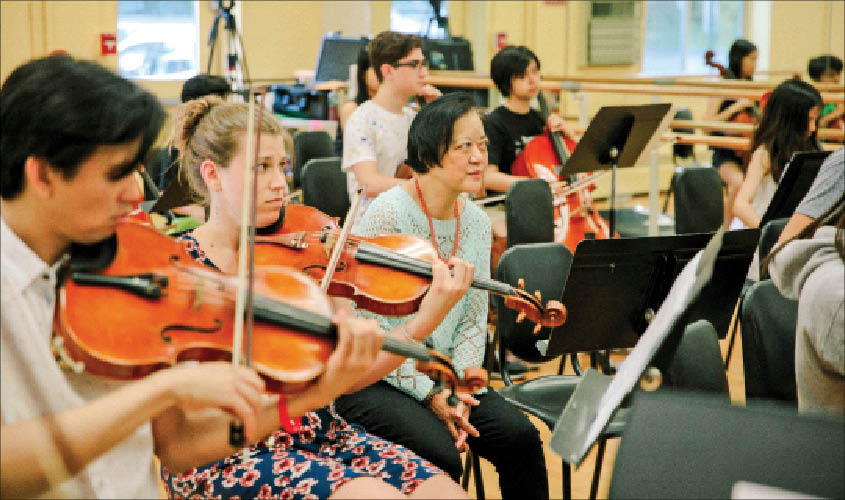When she began playing the violin at a very young age, Yeou-Cheng Ma was pronounced a prodigy, quite like her brother, the legendary cello player Yo-Yo Ma. But she was driven away from the violin and sidelined as a musician, writes Anthony Tommasini.
In 1962, Leonard Bernstein, presiding over a fundraiser in Washington called American Pageant for the Arts, introduced a 7-year-old cellist named Yo-Yo Ma. Among the honored guests were President John F. Kennedy—Jacqueline, too—and Dwight D. Eisenhower.
Yo-Yo, who had arrived to the United States from Paris a year earlier with his family, Bernstein said, would now perform the first movement of a concertino by Jean-Baptiste Bréval, accompanied at the piano by his 11-year-old sister, Yeou-Cheng Ma—who, Bernstein added, was “pursuing her musical studies.”
Their performance, which was televised (and can be seen online), was remarkable.
What Bernstein did not mention was that Yeou-Cheng’s primary instrument was the violin. Like her brother, she was a prodigy. At 10, she had performed the Mendelssohn Violin Concerto with the Denver Symphony.
But around that time, with little explanation, her parents ended her violin lessons. She continued with piano, however, and for the next decade was her brother’s primary accompanist. Already, it seemed, she was being directed away from a solo career and into a supportive role for Yo-Yo, now the world’s leading cellist.
In 1962, the same year as the Washington performance, their father, Hiao-Tsiun Ma, a conductor, musicologist and teacher, founded the Children’s Orchestra Society in New York. That orchestra will celebrate its 50th anniversary—there was a seven-year hiatus from the late-1970s to the early ’80s—with a gala concert at Carnegie Hall on Thursday, including Rimsky-Korsakov’s Scheherazade and works by Koussevitzky and Bruch.
When he founded the orchestra, Hiao-Tsiun Ma hoped that one of his children would take it over some day. That mission wound up falling to Yeou-Cheng, who in 1984 became the orchestra’s executive director even while working full-time as a developmental pediatrician at Albert Einstein College of Medicine. Her husband, Michael Dadap—a guitarist, composer and conductor—is the orchestra’s artistic director.
This is not the way Dr. Ma —Yeou-Cheng, that is—imagined her life in music unfolding when she was a child. She never considered taking over the orchestra following the retirement of her father in 1977 (which led to the hiatus). Everything changed when she met Dadap.
“Michael was a touring musician,” said Yeou-Cheng, 67. “When we were courting, trying to decide what to do about family, I asked him if he was going to continue touring. He said he would really like to have either a music school or a children’s orchestra. He didn’t even know that I had this organisation!”
The orchestra restarted with less than 20 students. Then word spread quickly.
“Someone started the rumour that Yo-Yo Ma’s sister was having an orchestra in Queens, and it was free,” Yeou-Cheng said. “It was actually $25 a semester back then—just enough to print the music for the students.”
It’s “a blessing that I have my brother as my brother,” she said. “He’s very famous, so that always attracts attention. But we never said he was part of it.”

With steady work and endless fundraising, the Children’s Orchestra Society grew. It now has an enrollment of about 145 students, mostly drawn from New York, New Jersey and Connecticut, and operates four orchestra divisions and numerous chamber ensembles. Dadap and Yeou-Cheng run the institution out of their house in Queens. Most rehearsals take place at the Long Island High School for the Arts in Syosset.
Over the years, Yeou-Cheng has reduced her schedule as a doctor to devote more time to the orchestra. She teaches and coaches students, and occasionally performs concerts. She also actively plays chamber music with friends.
Being essentially sidelined as a violinist at 11 was hurtful and confusing back then. The violin “was my voice,” she said in a 1994 interview with The New York Times. “I couldn’t stand it. All that work, and then, nothing.”
But today she expresses contentment with the course of her life. She believes deeply in the mission of the Children’s Orchestra Society, which auditions all applicants but accepts everyone regardless of talent.
“That goes back to the principle my father espoused, that music is a language,” Yeou-Cheng said. “So our verbal logo is ‘teaching children the language of music.’ Very few children cannot learn a language. So, music should be accessible rather than exclusive.”
Yeou-Cheng estimates that a few thousand students have passed through the Children’s Orchestra Society during the years she has been involved. Many young lives have been enriched by the association; Yeou-Cheng recalls one especially.
“At the time he was an angry teenager, so he wasn’t very appreciative of our programme,” she said. “Then he became a missionary. His mom got sick, and we visited with him, and he said something amazing: ‘Michael and Yeou-Cheng not only taught us to love music, they taught us how to love.’ I find that excruciatingly touching.”
© 2019 The New York Times

